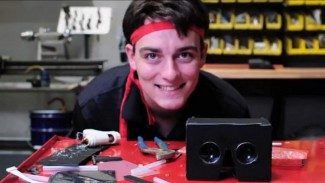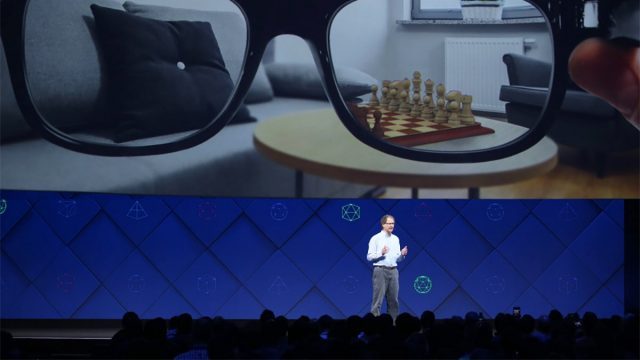Having founded Oculus in 2012 and been an important face for the company throughout its growth from fledgling startup to $2 billion acquisition by Facebook and beyond, it was a shock to see Palmer Luckey leave the company just two months ago. Having shied away from the public eye since September 2016 after the ousting of a polarizing political position, Luckey has gone on record in an interview for the first time since leaving the company.

Speaking with MoguraVR during a trip to Tokushima, Japan to attend the anime event Machi Asobi, Luckey opened up in Part 1 about his personal hobby of cosplay—a freedom he didn’t have while at Facebook—the Japanese VR market, and the future of VR headsets. In Part 2, he talked about virtual relationships, an obsession with Pokémon Go, and he teases what he’s working on next. Now in the third and final part of the interview, Luckey talks about the far future of VR with neural links & brain-computer interfaces, recorded memories, and his aim to revolutionize VR once again.
Half-Life 2: VR dev Marulu translated the article, which was originally published in Japanese, for Road to VR.
VR’s Mid to Long Term Form Factors & Interfaces
MoguraVR:
Palmer what do you think will be the final form of VR?
Palmer Luckey:
The final form will be a direct neural link. But that is still off in the very far future. I don’t know if it will become reality in our lifetime. It’s not that it is just hard on a technological level; we don’t know if it is possible at all. While technology might not yet be on that level there are some interesting research findings… it is a rather complicated to interface machines and consciousness using the brain.
MoguraVR:
If a neural link is the final form but still is very far away, what do you think VR will be like in a few decades?
Palmer Luckey:
What we will be able to realize is a combination of head mounted display and implant technology. By integrating sensors that can analyze muscle data at the arm and ears in combination with a extremely high quality VR HMD, an experience extremely close to reality should be possible. (It for example would become possible to feel the impact of a punch.) With this there would be no need to directly connect to the brain, and it would be safer.

MoguraVR:
Is the perfect form factor for VR HMDs sunglasses as Michael Abrash from Oculus always likes to say?
Palmer Luckey:
I also think so. Some people are thinking about contact lenses, but I don’t think that’s it. Even if there were a contact lens version it is obvious that the sunglasses would offer a better experience. Sunglasses would have the advantage in performance, display resolution and battery life.
Convergence of AR and VR Functionality
MoguraVR:
Let’s talk about the functions next. Lately several concepts besides VR have been presented such as AR, MR and Augmented VR. What do you think about this?
Palmer Luckey:
I don’t really care how people call it. In the end it will always just be VR or AR glasses, and I think at some point both will be in the same device. You will be able to go from the real world to the virtual world and you will also be able to experience a mix of the virtual and real world. The name for that might be MR, XR, AR or VR, the name varies from person to person [laughs].
MoguraVR:
Eventually it will all become the same thing.
Palmer Luckey:
The best portrayal of AR can be found in [the movie] Sword Art Online: Ordinal Scale. At the moment most AR devices are just about displaying HUD. On the other hand, the AR technology that appears in the theatrical version of SAO is closer to MR, and builds a virtual world based on reality. ‘Augma’ is a AR device in the literal sense.
[Spoiler Alert]
My favorite scene was the last. You can see that the ‘full dive’ system is secretly built into Augma. That’s exactly like how it will be in the future. Augma is VR, AR, and something in between. With only one device one can play AR games like ‘Ordinal Scale’ and VR games such ‘Sword Art Online’ and ‘Gungale Online’ and several others [the games within SAO’s fictional universe].
Augma was not only portrayed as a gaming device but also as useful for everyday activities, like going shopping or for going on a walk. I think that at some point VR and AR will lead up to a device like Augma.
MoguraVR:
A lot of things are going to become possible with AR and VR. And the combination of HMD and implants might take over 20 years.
Palmer Luckey:
It is hard to predict the future. If you step too far out with your predictions people will say ‘He didn’t know anything’ [laughs].
I know how an implant would work, and that’s why it will be possible in the future… it will take some time until ordinary people will become able to do it. The least I can say is that I am sure that it will be at least another five years until everyone will want to get an implant.







